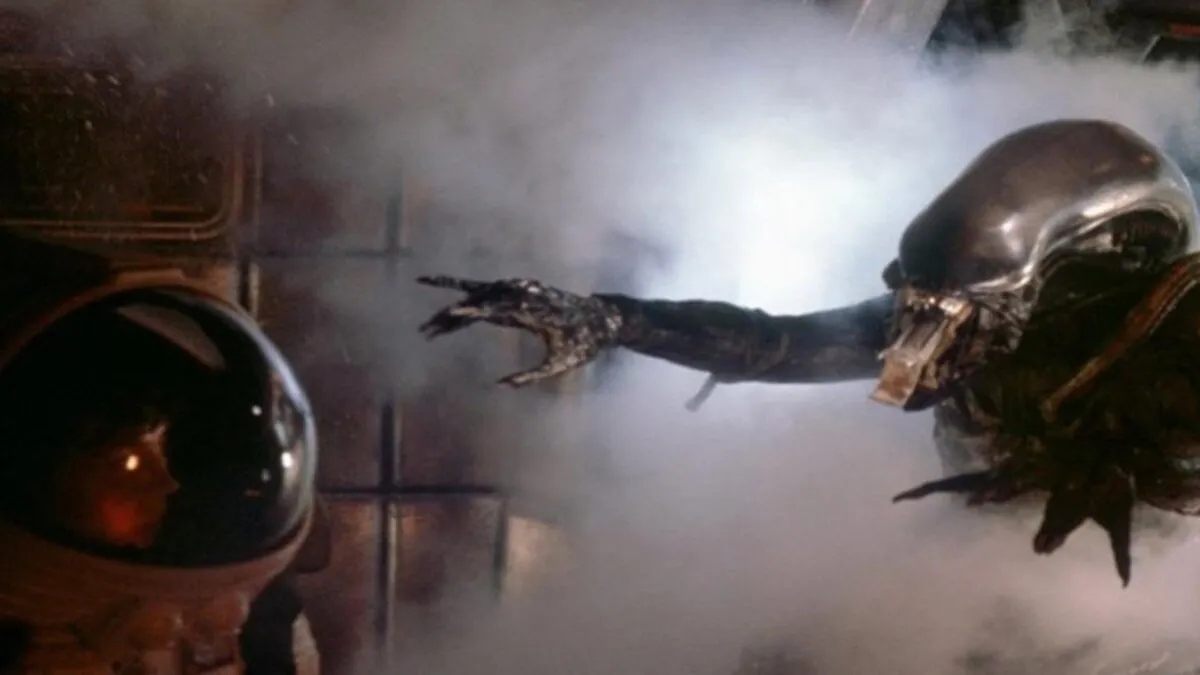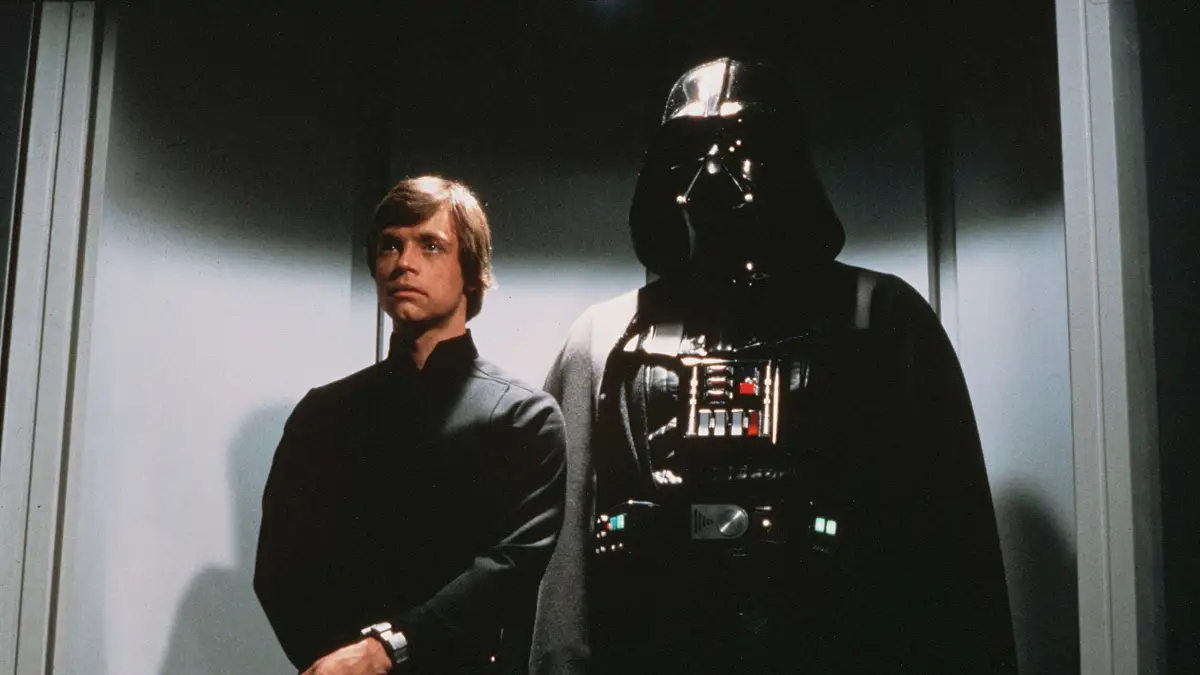This discussion and review contains spoilers for Star Trek: Lower Decks season 3, episode 6, “Hear All, Trust Nothing.”
If “Reflections” demonstrated the difficulty that Lower Decks can face when it tries to blend its nostalgia-infused approach to storytelling with a more conventionally dramatic character-driven narrative, then “Hear All, Trust Nothing” offers another example of the show’s limitations. “Hear All, Trust Nothing” brings the Cerritos to Deep Space Nine. In doing so, it offers a reminder of just how different Deep Space Nine is from all of the other Star Trek shows.
The recent generation of Star Trek spinoffs has been heavily saturated with nostalgia for the shows of the Berman era, particularly The Next Generation and Voyager. Seven of Nine (Jeri Ryan) is a regular on Picard. Kate Mulgrew is voicing a holographic representation of Kathryn Janeway on Prodigy, where Chakotay (Robert Beltran) is a recurring character. Next season, Picard will reunite the bulk of the cast of The Next Generation.
Lower Decks has featured significant appearances from Next Generation and Voyager regulars like William Riker (Jonathan Frakes), Deanna Troi (Marina Sirtis), and Tom Paris (Robert Duncan McNeill), along with cameos from characters like Sonya Gomez (Lycia Naff), Q (John de Lancie), Leah Brahms (Susan Gibney), and the Borg Queen (Alice Krige). While “Grounded” found the team visiting Sisko’s restaurant in New Orleans, its big guest star was James Cromwell as a Zephram Cochrane hologram.
While J.G. Hertzler reprised his role as Martok in “The Least Dangerous Game” and Jeffrey Combs voiced the evil computer AGIMUS, Deep Space Nine can barely seem to get a look in. Prior to “Hear All, Trust Nothing,” the most prominent recent appearance of a Deep Space Nine character was a guest appearance of Odo on Prodigy, cobbled together from existing recordings of the late actor Rene Auberjonois. It’s hardly equivalent to the love lavished on The Next Generation or Voyager.

Even the continuity of Deep Space Nine seems to exist quite separate from the modern television shows, which draw largely from the events of The Next Generation and Voyager. In the far future, Discovery deals with the consequences of “Unification.” Even Picard is less concerned with the consequences of the Dominion War than it is with picking up the threads of Nemesis. Prodigy explores the Delta Quadrant, while the state of the Gamma Quadrant remains a mystery.
It is clear that the production team working on Lower Decks loves Star Trek in all its forms, but Deep Space Nine stands curiously apart from the shared universe. Of the live-action Star Trek spinoffs, only Enterprise seems more marginalized. This makes sense. Deep Space Nine had its own internal continuity. It was set in a universe that was in a constant state of flux, where the politics and alliances of the major powers were constantly shifting.
Lower Decks is remarkably consistent at its own internal continuity, particularly as it relates to its characters. Mariner’s (Tawny Newsome) relationship with her mother, Freeman (Dawnn Lewis), has changed and developed over the show’s three seasons. Even within “Hear All, Trust Nothing,” there is a subplot built around the new “Bold Boimler” (Jack Quaid) introduced in “The Least Dangerous Game” and reinforced in “Room for Growth.” Tendi (Noël Wells) continues her career development.
However, Lower Decks has been somewhat hazier on the external context for the events happening on the show. Part of this is down to the fact that this is a comedy, so world-building is not a priority. Within the show’s own narrative, the Cerritos is a support ship, so it isn’t tied to larger galactic politics. It’s also possible that the show has been consigned to “the animation ghetto” and doesn’t enjoy the same freedom to rewrite the continuity of the shared universe as Discovery or Picard.

What is the state of the Alpha Quadrant in Lower Decks? Deep Space Nine seemed to lay out a bleak immediate future for the region in “Inter Arma Enim Silent Leges,” and Lower Decks seems to unfold in a universe where Sloan (William Sadler) was correct: The Federation is the only game in town. The actions of Captain Dorg (Colton Dunn) in “wej Duj” suggest the Klingon Empire is still as corrupt as ever and still in a slow decline like it was on The Next Generation and Deep Space Nine, but that’s it.
This isn’t normally an issue with Lower Decks. After all, Lower Decks isn’t the kind of show where that stuff matters. However, it is a problem when “Hear All, Trust Nothing” brings Lower Decks to Deep Space Nine. Part of the thrill of revisiting Deep Space Nine should be seeing how the station and its characters have changed and grown in the years since “What You Leave Behind.” So much changed in the seven years Deep Space Nine was on the air. What has happened since?
Has Bajor joined the Federation? Are Ezri Dax (Nicole DeBoer) and Julian Bashir (Alexander Siddig) still together, or was that a doomed fling? Is the Federation still exploring the Gamma Quadrant? How is Bajor recovering from the revelation that its spiritual leader, Kai Winn (Louise Fletcher), almost unleashed the Pah-wraiths? Is Jake Sisko (Cirroc Lofton) still on the station, waiting for his father to return? What happened to Kasidy Yates-Sisko (Penny Johnson) and her child?
Lower Decks is not a show equipped to answer any of these questions. Indeed, there are a variety of tie-in novels, like A Stitch in Time or The Never-Ending Sacrifice, that do explore these questions and build from these threads in a variety of ways. However, while it is too much to expect Lower Decks to explain how everything has changed, it is distracting to watch “Hear All, Trust Nothing” insist that nothing has changed. Deep Space Nine is trapped in amber, like the theme park in “Grounded.”

“Hear All, Trust Nothing” actively avoids trying to offer too many details about what has happened since the end of Deep Space Nine, but this just draws attention to the strangeness of the setup. The Federation is engaged in “post-war trade negotiations with the Karemma,” but are the Karemma representing the Dominion or their own interests? Quark’s (Armin Shimerman) outrage over the Dominion War is a front, but it raises questions about how veterans of the conflict must really feel.
That said, there is something clever in the way that “Hear All, Trust Nothing” deals with the character of Quark. In “Stardust Rag City,” Picard seemed to imply that Quark had successfully franchised his bar, with a location on Freecloud. This seemed to fundamentally misunderstand the character of Quark, who was defined by his consistent failure as a businessman, overshadowed by relatives like his cousin Gaila (Josh Pais) or his brother Rom (Max Grodénchik).
“Hear All, Trust Nothing” cleverly squares that circle, by revealing that Quark’s franchise success is built on the theft of a Karemma replicator and ending with Quark surrendering “76% of all his franchise’s profits” to the Karemma by way of restitution. It’s an effective ending, similar to other Quark-centric stories like “The House of Quark” or “Who Mourns for Morn?,” where Quark seems to stumble into massive financial success only to barely make it through the episode alive.
It is admittedly nice to see Quark and Kira (Nana Visitor) once again. There is a small moment where Kira watches the Karemma vessel fly through the wormhole, which seems to imply that she still thinks about Odo’s life on the other side. It’s interesting that, when recently asked about reprising her role in a modern Star Trek show, Visitor stated, “I would love it, but I would want to know that there was some kind of continuity, that it would really matter.” That continuity feels absent here.

That said, the most interesting aspect of “Hear All, Trust Nothing” has little to do with Deep Space Nine, at least directly. On the station, Tendi meets another Orion in Starfleet. While Tendi has seemed embarrassed of her Orion heritage in episodes like “Crisis Point,” Mesk (Adam Pally) aggressively and performatively leans into his culture’s reputation as “shady characters,” proudly boasting of the “religious exemption” he got to wear his “Orion multikey” with his uniform.
This is a twist on a classic Star Trek story, one very in step with modern debates about cultural identity. Tendi resents the expectations that come with being an Orion and reacts against Mesk’s embrace of those clichés. “It’s embarrassing, and sometimes it makes me not want to be associated with Orions at all,” she complains. Mesk is offended. “Somebody got all human-ed up at the Academy,” he snipes. “At least I remember where we came from.” Is Tendi “Orion enough”?
There is a clever twist in “Hear All, Trust Nothing,” when it is revealed that Mesk has no firsthand experience of Orion culture. “I never pirated anything in my whole stupid life,” he admits. “I’ve never even been to Orion. I’m from Cincinnati.” He offers a backstory that should sound familiar to even the most casual of Star Trek fans. “I got adopted by humans, and everything I know about Orions, I learned from holonovels — and bad ones too, the ones with boobs on the cover.”
Mesk is basically Worf (Michael Dorn) from The Next Generation and Deep Space Nine, an outsider raised by humans who has responded by leaning hard into the performance of an archetype of his birth culture. Worf was always a fascinating character because he got into thorny questions about cultural identity and performance. He knew everything there was to know about Klingon culture, but it was all academic. In some sense, he was overcompensating for his background.
This subplot with Mesk and Tendi is one of the more interesting things that modern Star Trek has done, taking a classic Star Trek trope and playing with it in a way that offers an interesting snapshot of a contemporary debate. What does it mean to belong to a particular culture? How does one define their identity through public performance directed at outsiders? This is stuff that Lower Decks does really well, and it ends up being much more satisfying than the show’s trip to Deep Space Nine.





